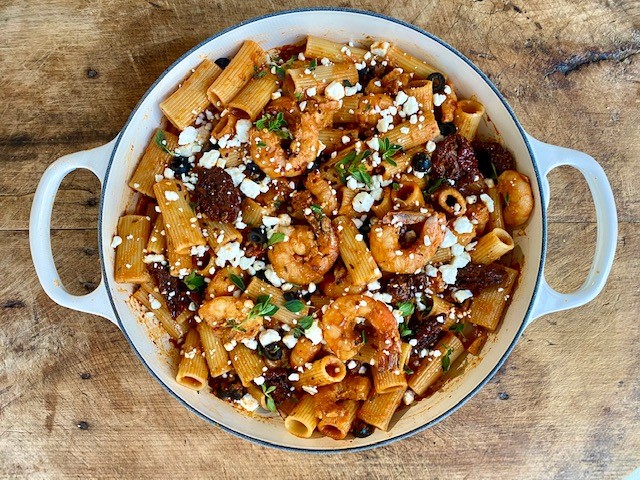
Going Viral Greek Shrimp Pasta
INGREDIENTS
- 1 pound rigatoni
- 1 pound shrimp, peeled and deveined
- 4 garlic cloves, minced
- 1 shallot, finely chopped
- 1 can (14 oz) crushed tomatoes
- 3/4 cup heavy whipping cream or half and half
- 4.3 ounces sun-dried tomatoes, drained
- 12 ounces artichoke hearts, drained
- 1/2 cup dry white wine
- 1 tsp red pepper flakes, more to taste
- 1 tsp each: dried oregano, thyme, and smoked paprika
- 1 tbsp fish sauce
- crumbled feta, sliced black olives, and lemon zest for serving
INSTRUCTIONS
- Boil the pasta in salted water until al dente. Drain, reserving the 1/2 cup of the cooking water.
- Add 3 tbsp oil to a skillet. Add shrimp, arrange in a single layer. Fry on high heat. Flip the shrimp over after 2 minutes and sear the other side until pink. Season with salt and pepper. Remove from skillet.
- Heat 2 tbsp oil, add garlic and shallot, sauté for 2 minutes. Using a wooden spoon, scrape up and stir in any brown bits from skillet bottom. Add white wine, cook over high heat until reduced, about 3 minutes. Add tomatoes and bring to a boil. Stir in the cream, sun-dried tomatoes, and artichoke hearts. Season with oregano, thyme, smoked paprika, chili flakes, fish sauce, salt, and pepper. Simmer over low heat until the sauce has thickened slightly, about 10 minutes.
- Add the cooked shrimp and reheat gently on medium heat.
- Stir in pasta. If the sauce is too thick and does not coat the pasta very well, add a splash of the pasta cooking water.
- Top with feta and olives. For an extra hint of flavor, add a little lemon zest.
